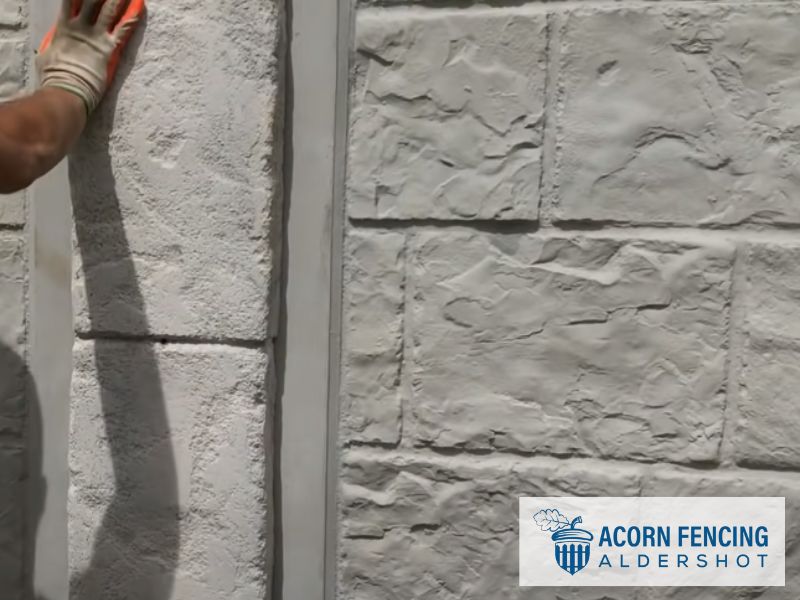When building a fence in the UK, one of the most important decisions is choosing the right material for the fence posts. The posts are critical for providing stability and ensuring the fence lasts for years to come. There is an ongoing debate whether concrete or cement is better suited for fence posts, especially given the unique climate and soil conditions in the UK. Seeking advice from experienced fencing contractors Aldershot can provide valuable insights into selecting the optimal material for your fence posts, ensuring durability and longevity in the challenging UK environment.
Understanding Cement and Concrete
Before comparing cement and concrete fence posts, it is helpful to understand what each material is and its relative properties.
What is Cement?
Cement is an ultrafine gray powder that serves as the binding agent when making concrete. It is made by heating limestone and clay minerals in a kiln to produce clinker, which is then ground to make cement.
- Composition: Cement consists of different compounds like tricalcium silicate, dicalcium silicate, tricalcium aluminate, and tetracalcium aluminoferrite.
- Properties: When mixed with water, cement undergoes a hydration reaction and hardens. It binds well to other materials.
- Applications: As the key ingredient in concrete, widely used in construction including posts, foundations, and walls.
So cement is an active binding agent used to make concrete.
What is Concrete?
Concrete is a mixture of cement, sand, gravel, water, and other aggregates. The cement binds the mixture together when hydrated.
- Mixing: Concrete is formed by mixing measured amounts of cement, aggregates like sand and gravel, and water.
- Strength: Concrete gains strength over time through the cement hydration reaction. Reinforcing materials can enhance strength.
- Durability: Properly mixed concrete is highly durable and resistant to weathering, wear, and pressures.
Since concrete contains cement bonded with other materials, it differs from pure cement. This composition affects its properties and performance.
Factors Influencing Choice of Fence Post Material in UK
Climate, soil conditions, and cost considerations are key factors when determining whether concrete or cement is optimal for fence posts in the UK.
Climate Considerations
The wet, variable climate in the UK influences material performance:
- Rain, wind, frost require materials to flex and resist moisture damage over time.
- Concrete can crack under freeze-thaw cycles as water penetrates pores.
- Cement is also vulnerable to cracking from contraction/expansion.
Therefore, moisture resistance without becoming overly rigid is important.
Soil Composition and Type
Different soil characteristics impact post materials:
- Clay soils can shift over time due to moisture changes, requiring flex in posts.
- Acidic soils can react with and degrade concrete slowly.
- Proper installation based on soil type improves stability and longevity.
The right choice balances soil interactions and installation methods.
Cost Considerations
There are short and long term economic factors to weigh:
- Cement is typically less expensive than concrete initially.
- But concrete is often more durable, reducing long term maintenance and repairs.
- Higher initial concrete post cost may save money over the fence lifespan.
Balancing initial costs versus long term value is important.
Cement vs. Concrete Fence Posts in UK Conditions
Given the climate and soil analysis, how do cement and concrete fence posts compare for UK installations?
Cement Fence Posts
Cement posts have benefits but also disadvantages:
- Good compressive strength and stability when installed properly.
- Low cost compared to concrete.
- Vulnerable to cracks from freeze/thaw cycles.
- Brittleness does not flex well in shifting or acidic soils.
Concrete Fence Posts
Concrete also carries pros and cons:
- Very durable material resistant to weathering.
- Higher strength yet still somewhat flexible.
- Heavier weight makes handling and transport more difficult.
- Higher initial costs than cement.
So there are good arguments on both sides regarding cement versus concrete for fence posts in the UK.
Frequently Asked Questions
There are several common questions surrounding cement, concrete and fence posts:
Can I use cement and concrete interchangeably for posts?
No, cement and concrete are different materials with different properties when used for posts. Cement is the binding agent, concrete is the mixture including cement.
How does the UK climate impact the cement vs concrete choice?
The wet climate and freeze/thaw cycles make concrete more vulnerable to cracking over time. Cement also cracks but is cheaper to replace.
What soil type is best for cement or concrete fence posts?
Concrete performs better than cement in acidic soils. Both can shift in highly expansive soils, requiring deeper installation.
Are there environmental considerations?
Concrete manufacturing creates more carbon dioxide emissions than cement production. But concrete posts may last longer, offsetting cement replacement.
Is there a large price difference?
Cement is initially cheaper than concrete, but concrete lasts longer so its long term cost may be lower.
How much maintenance is required?
Check posts at least annually for cracks, damage, or shifting. Repair issues immediately to prevent worsening. Cement may need more frequent replacement than concrete.
Thanks for reading our post, feel free to check out our other services:











